ASTANA – President Kassym-Jomart Tokayev paid an official visit to France on Nov. 4-5, meeting with French President Emmanual Macron and top business leaders. In a rapidly changing geopolitical landscape, Tokayev’s visit to France, his second in two years, signals a deepening strategic partnership with France, one of the European Union’s (EU) most influential states.
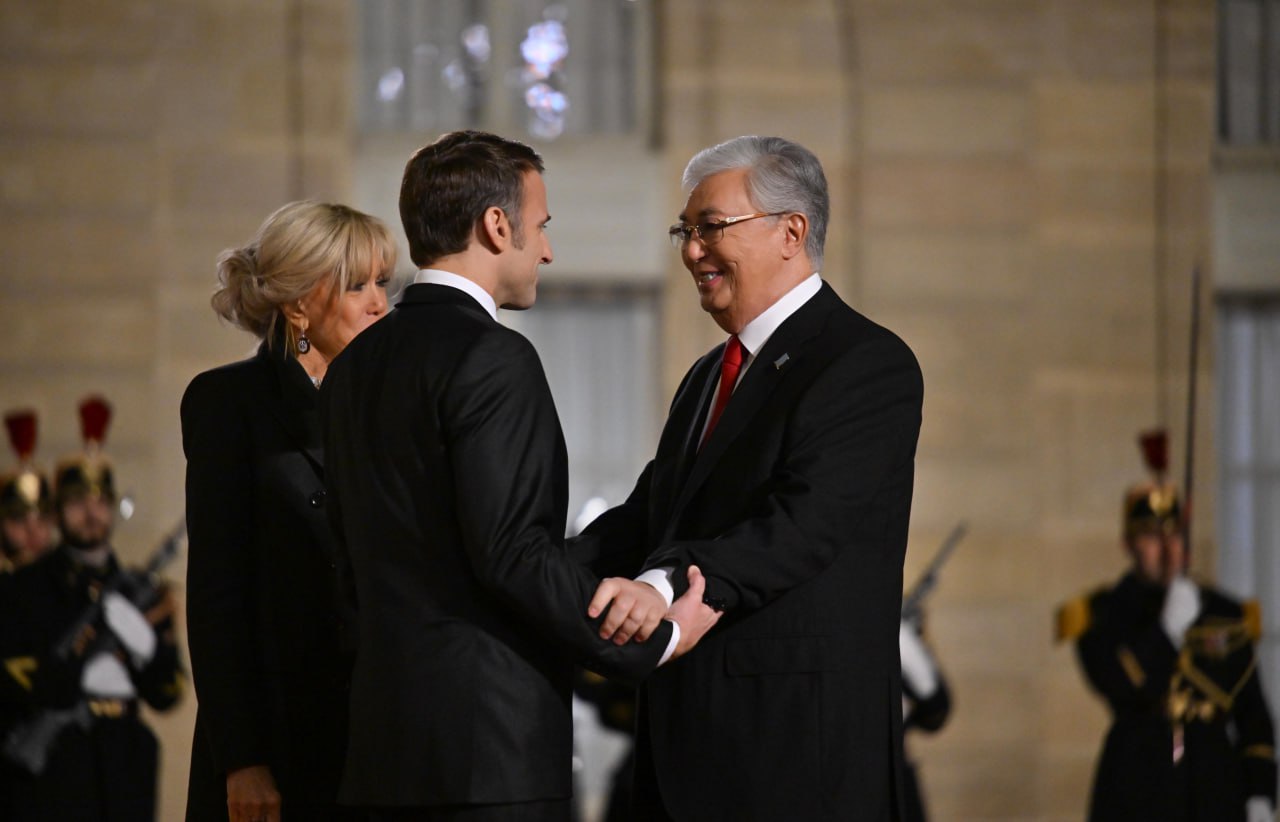
Emmanuel Macron receives President Tokayev at an official reception on Nov. 5. Photo credit: akorda.kz
Strategic partnership based on mutual values
Tokayev’s visit was more than a routine diplomatic exchange. In many ways, it continued the dialogue that began in November 2022 with his first visit to Paris as the President of Kazakhstan, followed by Macron’s trip to Kazakhstan a year later. These back-to-back high-level exchanges reflect France’s reinvigorated focus on Kazakhstan and Central Asia in its foreign policy and underscore Kazakhstan’s aspirations to build a strong presence in Europe.
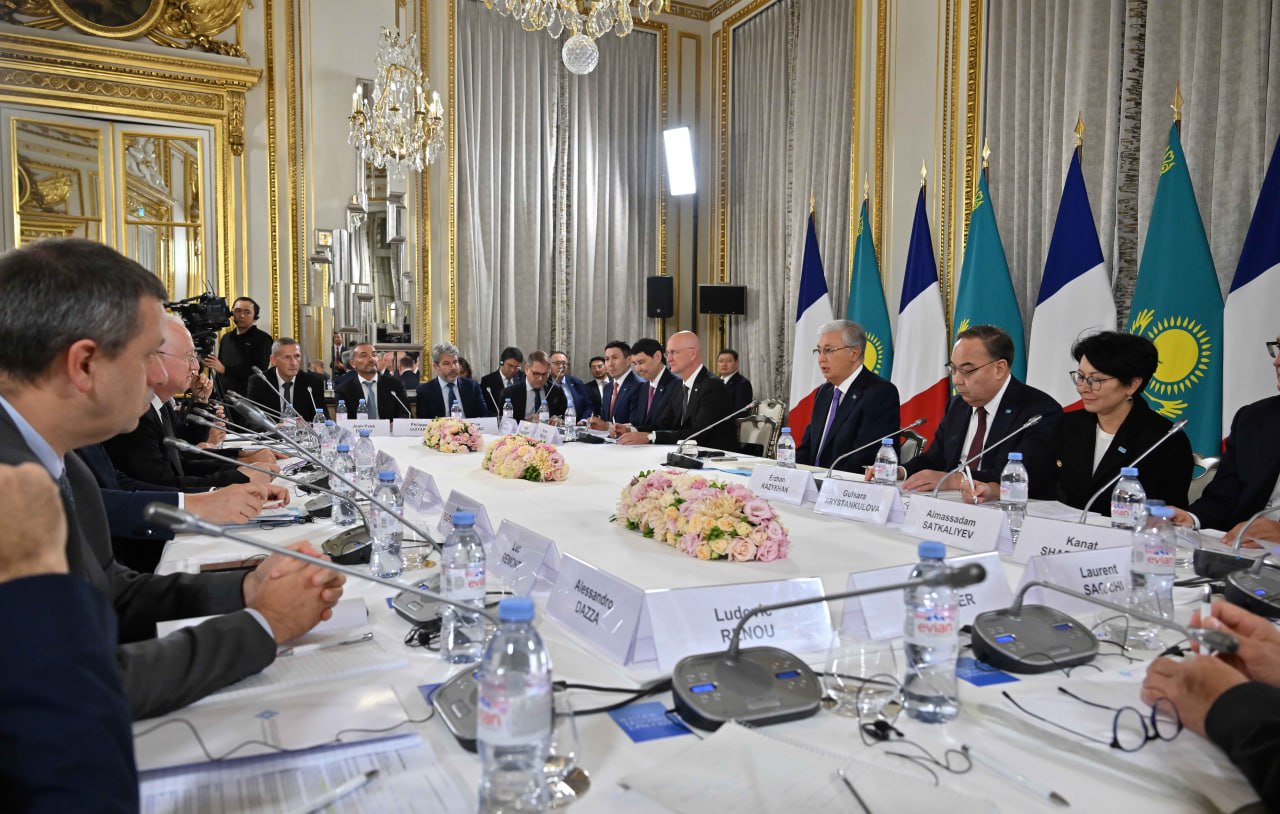
Tokayev addresses the investment roundtable, which gathered representatives of the Kazakh government and corporations and French businesses. Photo credit: akorda.kz
For Tokayev, his visit was of “exceptional importance” and marked a new milestone in the strategic partnership between Kazakhstan and France. This year marks 16 years since the signing of the strategic partnership agreement in 2008.
“Today, our countries maintain an active and trusting political dialogue. Kazakhstan and France work closely together on the international stage, jointly promoting the principles of peace and sustainable development through multilateral platforms,” said Tokayev, addressing Macron at an expanded meeting with delegations on Nov. 5.
Natural convergence
Miras Zhiyenbayev, head of the Foreign Policy and International Studies Program at Maqsut Narikbayev Institute for Networking and Development (MIND) of the Maqsut Narikbayev University, noted that global shifts and challenges, including in the security domain, are becoming “natural catalysts” for closer relations between the two countries.
“The development of Kazakhstan’s relations with France, from a political, trade, and investment point of view, is in the national interests of both sides. (…) It is important for Paris and Astana to strategically converge to adapt to the challenges of the future and maintain interregional stability,” Zhiyenbayev told The Astana Times.
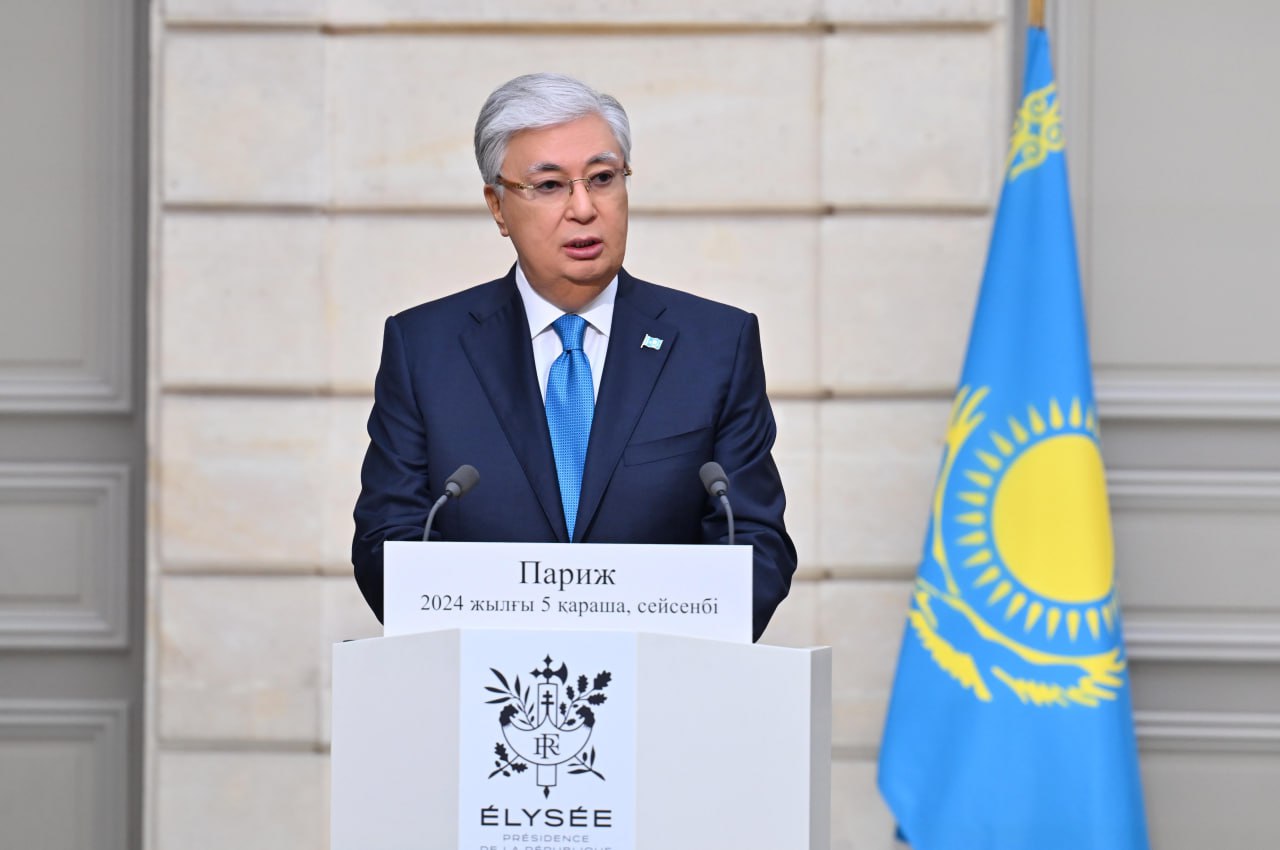
Tokayev delivers remarks at a joint press briefing. Photo credit: akorda.kz
Zhiyenbayev highlighted the “clear political will” of both leaders to “work together to deepen the relations and cultivate qualitatively new areas of cooperation.”
“Kazakhstan and France demonstrate a similarity in the fundamental principles of the strategic culture of both nations – solidarity, equality and peace. This common ground is an important starting point that demonstrates the like-minded behavior of our nations and a shared perspective on global shifts in the world and strategies for adapting to them,” he said.
Intensifying trade and investment
Trade between Kazakhstan and France is steadily growing, with France serving as one of Kazakhstan’s key trading and investment partners.
According to the Kazakh Bureau of National Statistics, in 2023, trade volume reached $4.2 billion, with $2.9 billion from Kazakh exports, and $1.3 billion from imports. In the first eight months of 2024 alone, trade figures reached $4 billion.
France has also been a significant investor in Kazakhstan’s economy. Data from the Kazakh Foreign Ministry shows that cumulative French investments in Kazakhstan have exceeded $19 billion since 2005.
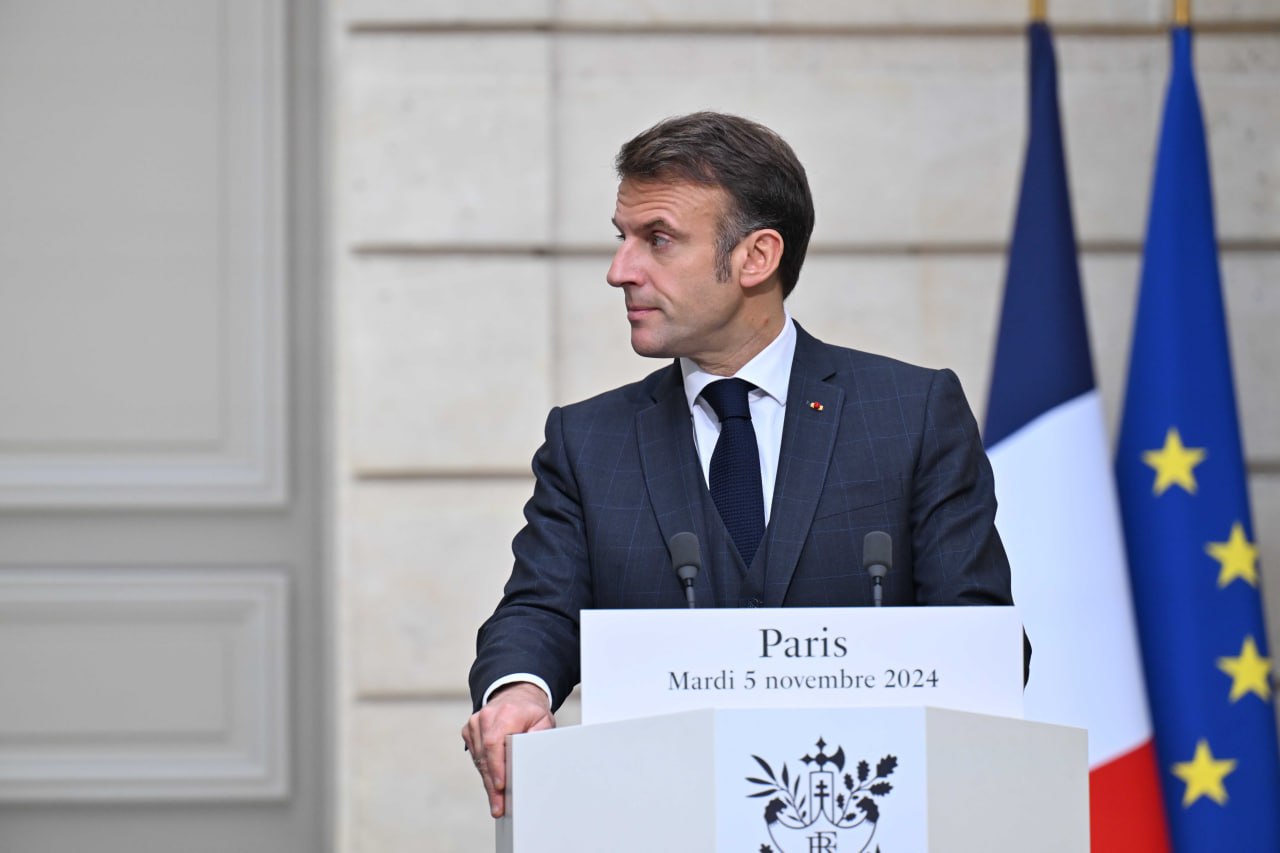
Emmanual Macron reaffirmed the importance of the bilateral strategic partnership concluded in 2008. Photo credit: akorda.kz
Around 200 companies with French capital operate in Kazakhstan, including major corporations such as Total, Orano, Airbus, Air Liquide, Alstom, Idemia, Saint-Gobain, and Danone. Joint ventures are engaged in producing electric locomotives, railway equipment, titanium products for the aerospace industry, pharmaceuticals, and food products.
The visit concluded with the signing of multiple agreements worth $2.2 billion.
According to Michaël Levystone, a French researcher focusing on Central Asia and a PhD student at the Europes-Eurasia Research Center (CREE) of Institut National des Langues et Civilisations Orientales (INALCO), there are substantial opportunities for French investors in Kazakhstan.
“A wide array of opportunities may present itself to French investors in Kazakhstan in agricultural machinery, connectivity to help materialize Président Tokaeyv’s undisputable will to modernize and expand Kuryk and Aktau ports handling and export capacities,” he told The Astana Times.
There is also significant potential for growth in the renewable energy sector.
“France already got a good name through Air Liquide and TotalEnergies’s prominent projects consisting of building of green hydrogen, wind and solar plants in southern and eastern Kazakhstan,” he added.
What is the interest?
Engagement with France is part of Kazakhstan’s multi-vector foreign policy. On the other hand, France’s expertise in such areas as energy and infrastructure aligns well with Kazakhstan’s ambitions at home. As Kazakhstan seeks to reduce its economic dependency on natural resources, France is an ideal collaborator in diversifying its economic base.
Energy cooperation remains at the forefront of this relationship, said Tokayev at a Nov. 5 investment roundtable. Kazakhstan’s energy sector features French giant Orano, which has been operating in Kazakhstan since 1996 through KATCO, a joint venture between Orano (51%) and the Kazatomprom national company (49%). KATCO manages the Muyunkum and Tortkuduk uranium deposits in southern Kazakhstan.
Kazakhstan is positioning itself as a reliable and resource-rich energy partner for France and the European Union. The nation currently extracts 19 of the 34 most important raw materials essential to the EU economy.
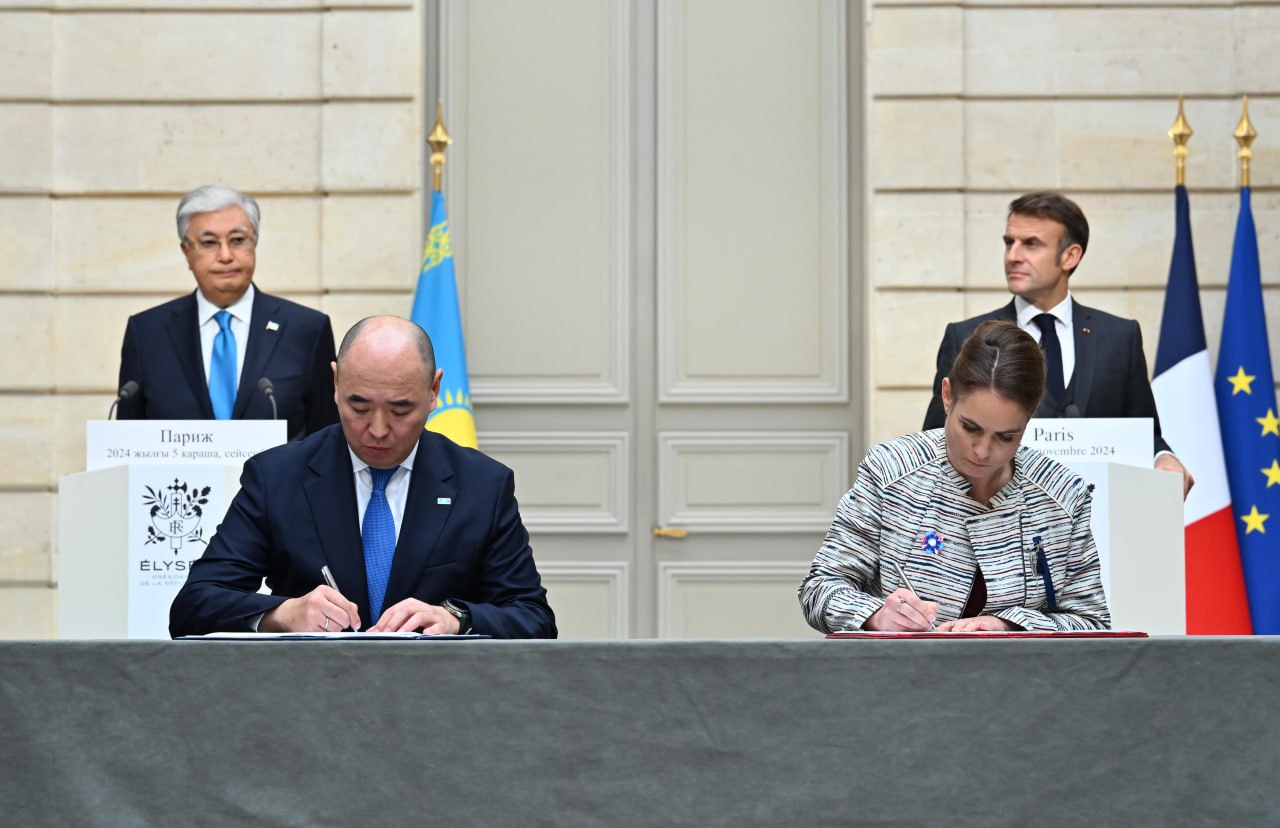
Kazakh Minister of Industry and Construction Kanat Sharlapayev and French Delegate Minister for Energy Olga Givernet sign a roadmap on the cooperation in critical minerals. Photo credit: akorda.kz
As part of the visit, the two countries signed a roadmap for strategic partnership in critical resources and materials for 2024-2026. The roadmap aims to strengthen cooperation in creating sustainable supply chains and launching projects on raw materials exploration and mining, battery manufacturing, and transitioning to green standards.
With France’s leadership in clean energy technology and Kazakhstan’s vast potential for renewable resources, the partnership is naturally aligned toward sustainable energy initiatives. Nuclear energy is also an area in which both countries are committed to responsible development.
According to Michaël Levystone, French interests in Kazakhstan mainly focus on natural resources, such as uranium and oil.
“France has considered Kazakhstan a partner of one kind in Central Asia since the signing of their strategic partnership agreement in Paris by then Presidents Sarkozy and Nazarbayev. It is with Kazakhstan that France enjoys the most substantial economic ties, six or seven times as big as those existing between France and Uzbekistan, the other putative France’s Central Asian strategic partner,” said Levystone.
International agenda and One Water Summit
According to Macron, the strategic partnership is reflected in a deep convergence on major international challenges.
“We share the same commitment to multilateralism, respect for the Charter of the United Nations and international order based on rules which apply to all in all circumstances,” said Macron at a joint press briefing on Nov. 5. The war in Ukraine, he noted as a significant challenge to European security, was also on the agenda.
Zhiyenbayev points to a broader multilateral agenda as an important part of the current visit, where the two nations “have much to discuss.”
“Kazakhstan provides constructive support in resolving the conflict between Armenia and Azerbaijan. Peace in the South Caucasus is important for developing the Middle Corridor. The development of the Middle Corridor illustrates Kazakhstan’s regional leadership. This route not only strengthens Central Asia’s connectivity but also positions the region as a critical component of Eurasian trade, bypassing Russian transit routes,” said the Kazakh expert.
During their meeting, Tokayev and Macron reviewed the preparation for the One Water Summit in December.
“Overall, France and Kazakhstan are engaged on the same path in the fight against climate change, sharing a common goal to reduce GHG [greenhouse gas] emissions. In line with the 2015 Paris Agreement, Kazakhstan has committed itself to reach carbon neutrality up to 2060,” said Levystone.
Zhiyenbayev also emphasized the importance of climate initiatives as a crucial component of the bilateral ties.
